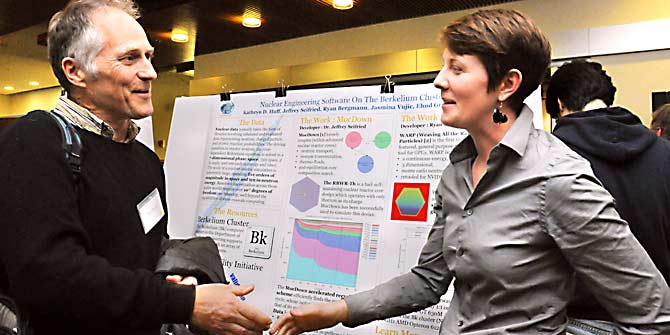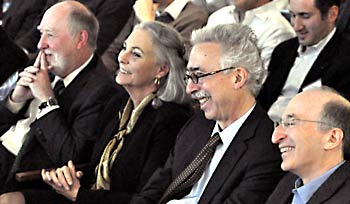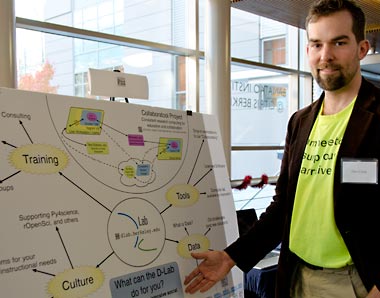Big turnout for launch of big-data center

It was standing room only in Sutardja Dai Hall’s Banatao Auditorium, with many more watching monitors in the overflow section, at Thursday’s high-energy launch of the Berkeley Institute for Data Science.
On hand to celebrate (left to right): Vice Chancellor for Research Graham Fleming, Moore Foundation’s Vicki Chandler, Chancellor Dirks and BIDS director Saul Perlmutter (Peg Skorpinski photo)

Right now, at Berkeley, is “the time and place to do this,” Nobel laureate Saul Perlmutter, BIDS’ inaugural director, told the enthusiastic throng on hand for the kickoff.
In a world now awash in data but short on the skills and tools needed to tap and share its riches effectively, Perlmutter said, advances in data science could help scholars “find what’s available and contribute” in unprecedented ways: “We could invent the equivalent of the peer-review journal.”
In a nod to the major campus collaboration that helped UC Berkeley secure funding for BIDS, Chancellor Nick Dirks noted that innovation in research is one of the central pillars of his agenda. “I can now claim I’m moving ahead” on that, he joked.
Through advances in the use of data “we can revolutionize how science is practiced” and thus “stimulate discoveries,” predicted Vicki Chandler, chief program officer for the Gordon and Betty Moore Foundation’s science program. The Moore and Sloan foundations have together pledged $37.8 million, shared by UC Berkeley, the University of Washington and New York University, for data-science work over five years.
In the social sciences, says DLab’s Dav Clark, “the issue is the on-ramp” — getting scholars up to speed on data-science skills. (Cathy Cockrell photo)

In a series of “lightning talks” from the stage, and then at a “data science faire” outside the auditorium, faculty and students showcased more than 80 research projects that leverage data science to answer vexing questions — from the hidden economic impact of typhoonsto how protesters and police interact in street demonstrations.
“Any kid with a computer can mash up data,” noted Brent Mishler, director of the University and Jepson Herbaria, near poster displays in the hallway. But Berkeley has something unusual: rich sources of “legacy data” — such as-yet-untapped information embodied in its natural-history collections — as well as new streams of information and a phalanx of scientists making use of them.
The campus herbaria, he noted, are in the process of digitizing mountains of data associated with plant specimens collected for more than a century — information that will be crucial in helping scientists understand the impact of climate change.
BIDS will be housed in Doe Library, room 190, which at one time held the library’s card catalog, recalled Keith Gilless, dean of the College of Natural Resources. Later it was home to a maps collection, and starting in spring 2014, will become the new hotspot for learning and collaborating around data.
“That’s a nice evolution,” he said, reflecting on the important and changing role that libraries are likely to play in the future.
